Ruilin Luo
From Sparse Decisions to Dense Reasoning: A Multi-attribute Trajectory Paradigm for Multimodal Moderation
Jan 28, 2026Abstract:Safety moderation is pivotal for identifying harmful content. Despite the success of textual safety moderation, its multimodal counterparts remain hindered by a dual sparsity of data and supervision. Conventional reliance on binary labels lead to shortcut learning, which obscures the intrinsic classification boundaries necessary for effective multimodal discrimination. Hence, we propose a novel learning paradigm (UniMod) that transitions from sparse decision-making to dense reasoning traces. By constructing structured trajectories encompassing evidence grounding, modality assessment, risk mapping, policy decision, and response generation, we reformulate monolithic decision tasks into a multi-dimensional boundary learning process. This approach forces the model to ground its decision in explicit safety semantics, preventing the model from converging on superficial shortcuts. To facilitate this paradigm, we develop a multi-head scalar reward model (UniRM). UniRM provides multi-dimensional supervision by assigning attribute-level scores to the response generation stage. Furthermore, we introduce specialized optimization strategies to decouple task-specific parameters and rebalance training dynamics, effectively resolving interference between diverse objectives in multi-task learning. Empirical results show UniMod achieves competitive textual moderation performance and sets a new multimodal benchmark using less than 40\% of the training data used by leading baselines. Ablations further validate our multi-attribute trajectory reasoning, offering an effective and efficient framework for multimodal moderation. Supplementary materials are available at \href{https://trustworthylab.github.io/UniMod/}{project website}.
CAPO: Reinforcing Consistent Reasoning in Medical Decision-Making
Jun 15, 2025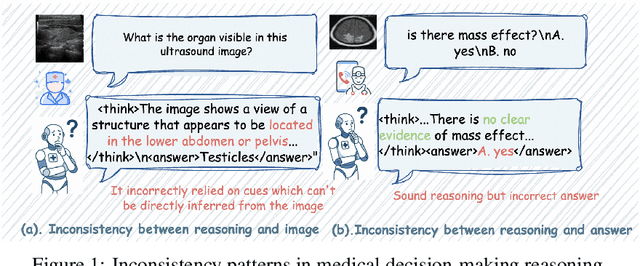
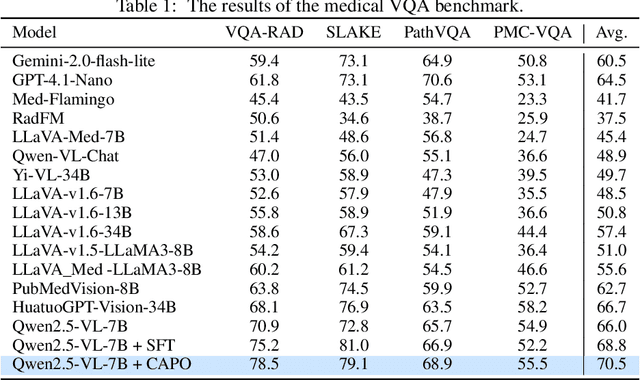
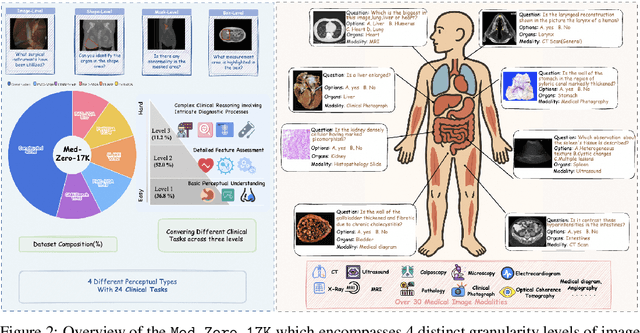
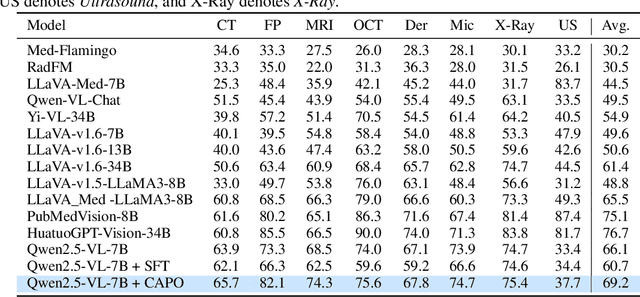
Abstract:In medical visual question answering (Med-VQA), achieving accurate responses relies on three critical steps: precise perception of medical imaging data, logical reasoning grounded in visual input and textual questions, and coherent answer derivation from the reasoning process. Recent advances in general vision-language models (VLMs) show that large-scale reinforcement learning (RL) could significantly enhance both reasoning capabilities and overall model performance. However, their application in medical domains is hindered by two fundamental challenges: 1) misalignment between perceptual understanding and reasoning stages, and 2) inconsistency between reasoning pathways and answer generation, both compounded by the scarcity of high-quality medical datasets for effective large-scale RL. In this paper, we first introduce Med-Zero-17K, a curated dataset for pure RL-based training, encompassing over 30 medical image modalities and 24 clinical tasks. Moreover, we propose a novel large-scale RL framework for Med-VLMs, Consistency-Aware Preference Optimization (CAPO), which integrates rewards to ensure fidelity between perception and reasoning, consistency in reasoning-to-answer derivation, and rule-based accuracy for final responses. Extensive experiments on both in-domain and out-of-domain scenarios demonstrate the superiority of our method over strong VLM baselines, showcasing strong generalization capability to 3D Med-VQA benchmarks and R1-like training paradigms.
URSA: Understanding and Verifying Chain-of-thought Reasoning in Multimodal Mathematics
Jan 08, 2025



Abstract:Chain-of-thought (CoT) reasoning has been widely applied in the mathematical reasoning of Large Language Models (LLMs). Recently, the introduction of derivative process supervision on CoT trajectories has sparked discussions on enhancing scaling capabilities during test time, thereby boosting the potential of these models. However, in multimodal mathematical reasoning, the scarcity of high-quality CoT training data has hindered existing models from achieving high-precision CoT reasoning and has limited the realization of reasoning potential during test time. In this work, we propose a three-module synthesis strategy that integrates CoT distillation, trajectory-format rewriting, and format unification. It results in a high-quality CoT reasoning instruction fine-tuning dataset in multimodal mathematics, MMathCoT-1M. We comprehensively validate the state-of-the-art (SOTA) performance of the trained URSA-7B model on multiple multimodal mathematical benchmarks. For test-time scaling, we introduce a data synthesis strategy that automatically generates process annotation datasets, known as DualMath-1.1M, focusing on both interpretation and logic. By further training URSA-7B on DualMath-1.1M, we transition from CoT reasoning capabilities to robust supervision abilities. The trained URSA-RM-7B acts as a verifier, effectively enhancing the performance of URSA-7B at test time. URSA-RM-7B also demonstrates excellent out-of-distribution (OOD) verifying capabilities, showcasing its generalization. Model weights, training data and code will be open-sourced.
Critical Tokens Matter: Token-Level Contrastive Estimation Enhances LLM's Reasoning Capability
Dec 02, 2024



Abstract:Large Language Models (LLMs) have exhibited remarkable performance on reasoning tasks. They utilize autoregressive token generation to construct reasoning trajectories, enabling the development of a coherent chain of thought. In this work, we explore the impact of individual tokens on the final outcomes of reasoning tasks. We identify the existence of ``critical tokens'' that lead to incorrect reasoning trajectories in LLMs. Specifically, we find that LLMs tend to produce positive outcomes when forced to decode other tokens instead of critical tokens. Motivated by this observation, we propose a novel approach - cDPO - designed to automatically recognize and conduct token-level rewards for the critical tokens during the alignment process. Specifically, we develop a contrastive estimation approach to automatically identify critical tokens. It is achieved by comparing the generation likelihood of positive and negative models. To achieve this, we separately fine-tune the positive and negative models on various reasoning trajectories, consequently, they are capable of identifying identify critical tokens within incorrect trajectories that contribute to erroneous outcomes. Moreover, to further align the model with the critical token information during the alignment process, we extend the conventional DPO algorithms to token-level DPO and utilize the differential likelihood from the aforementioned positive and negative model as important weight for token-level DPO learning.Experimental results on GSM8K and MATH500 benchmarks with two-widely used models Llama-3 (8B and 70B) and deepseek-math (7B) demonstrate the effectiveness of the propsoed approach cDPO.
PTD-SQL: Partitioning and Targeted Drilling with LLMs in Text-to-SQL
Sep 21, 2024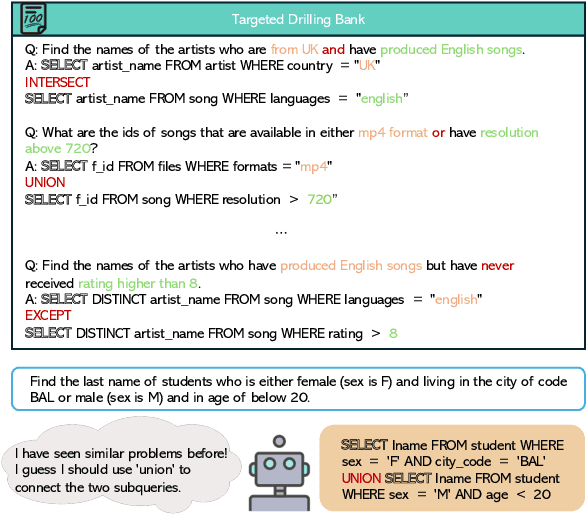

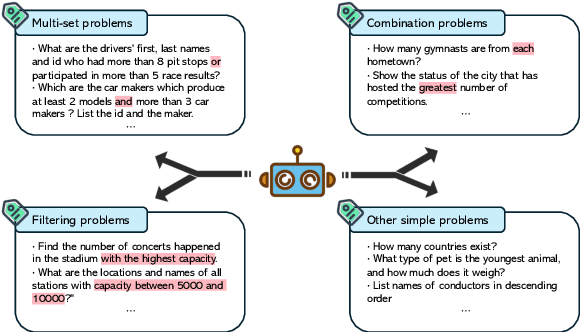
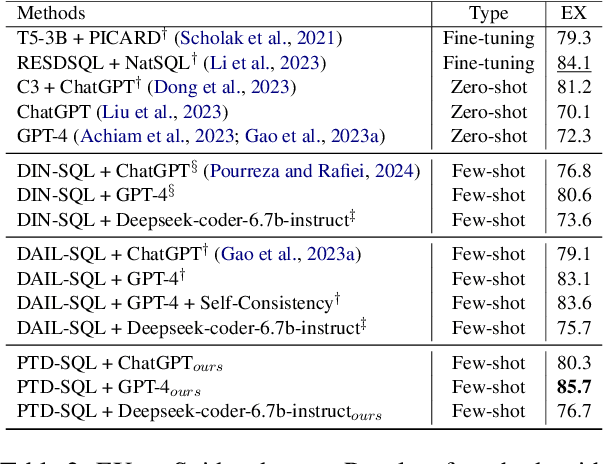
Abstract:Large Language Models (LLMs) have emerged as powerful tools for Text-to-SQL tasks, exhibiting remarkable reasoning capabilities. Different from tasks such as math word problems and commonsense reasoning, SQL solutions have a relatively fixed pattern. This facilitates the investigation of whether LLMs can benefit from categorical thinking, mirroring how humans acquire knowledge through inductive reasoning based on comparable examples. In this study, we propose that employing query group partitioning allows LLMs to focus on learning the thought processes specific to a single problem type, consequently enhancing their reasoning abilities across diverse difficulty levels and problem categories. Our experiments reveal that multiple advanced LLMs, when equipped with PTD-SQL, can either surpass or match previous state-of-the-art (SOTA) methods on the Spider and BIRD datasets. Intriguingly, models with varying initial performances have exhibited significant improvements, mainly at the boundary of their capabilities after targeted drilling, suggesting a parallel with human progress. Code is available at https://github.com/lrlbbzl/PTD-SQL.
MEOW: MEMOry Supervised LLM Unlearning Via Inverted Facts
Sep 18, 2024Abstract:Large Language Models (LLMs) can memorize sensitive information, raising concerns about potential misuse. LLM Unlearning, a post-hoc approach to remove this information from trained LLMs, offers a promising solution to mitigate these risks. However, previous practices face three key challenges: 1. Utility: successful unlearning often causes catastrophic collapse on unrelated tasks. 2. Efficiency: many methods either involve adding similarly sized models, which slows down unlearning or inference, or require retain data that are difficult to obtain. 3. Robustness: even effective methods may still leak data via extraction techniques. To address these challenges, we propose MEOW, a simple yet effective gradient descent-based unlearning method. Specifically, we use an offline LLM to generate a set of inverted facts. Then, we design a new metric, MEMO, to quantify memorization in LLMs. Finally, based on the signals provided by MEMO, we select the most appropriate set of inverted facts and finetune the model based on them. We evaluate MEOW on the commonly used unlearn benchmark, ToFU, with Llama2-7B-Chat and Phi-1.5B, and test it on both NLU and NLG tasks. Results demonstrate significant improvement of MEOW in forget quality without substantial loss in model utility. Meanwhile, MEOW does not exhibit significant degradation in NLU or NLG capabilities, and there is even a slight improvement in NLU performance.
Progressive Knowledge Graph Completion
Apr 15, 2024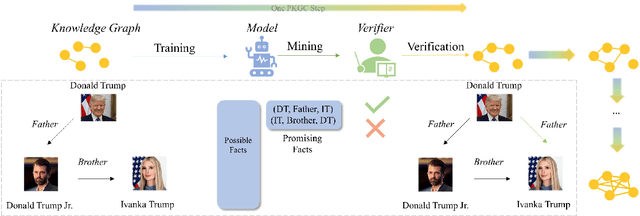



Abstract:Knowledge Graph Completion (KGC) has emerged as a promising solution to address the issue of incompleteness within Knowledge Graphs (KGs). Traditional KGC research primarily centers on triple classification and link prediction. Nevertheless, we contend that these tasks do not align well with real-world scenarios and merely serve as surrogate benchmarks. In this paper, we investigate three crucial processes relevant to real-world construction scenarios: (a) the verification process, which arises from the necessity and limitations of human verifiers; (b) the mining process, which identifies the most promising candidates for verification; and (c) the training process, which harnesses verified data for subsequent utilization; in order to achieve a transition toward more realistic challenges. By integrating these three processes, we introduce the Progressive Knowledge Graph Completion (PKGC) task, which simulates the gradual completion of KGs in real-world scenarios. Furthermore, to expedite PKGC processing, we propose two acceleration modules: Optimized Top-$k$ algorithm and Semantic Validity Filter. These modules significantly enhance the efficiency of the mining procedure. Our experiments demonstrate that performance in link prediction does not accurately reflect performance in PKGC. A more in-depth analysis reveals the key factors influencing the results and provides potential directions for future research.
CriticBench: Benchmarking LLMs for Critique-Correct Reasoning
Mar 08, 2024



Abstract:The ability of Large Language Models (LLMs) to critique and refine their reasoning is crucial for their application in evaluation, feedback provision, and self-improvement. This paper introduces CriticBench, a comprehensive benchmark designed to assess LLMs' abilities to critique and rectify their reasoning across a variety of tasks. CriticBench encompasses five reasoning domains: mathematical, commonsense, symbolic, coding, and algorithmic. It compiles 15 datasets and incorporates responses from three LLM families. Utilizing CriticBench, we evaluate and dissect the performance of 17 LLMs in generation, critique, and correction reasoning, i.e., GQC reasoning. Our findings reveal: (1) a linear relationship in GQC capabilities, with critique-focused training markedly enhancing performance; (2) a task-dependent variation in correction effectiveness, with logic-oriented tasks being more amenable to correction; (3) GQC knowledge inconsistencies that decrease as model size increases; and (4) an intriguing inter-model critiquing dynamic, where stronger models are better at critiquing weaker ones, while weaker models can surprisingly surpass stronger ones in their self-critique. We hope these insights into the nuanced critique-correct reasoning of LLMs will foster further research in LLM critique and self-improvement.
Chain of History: Learning and Forecasting with LLMs for Temporal Knowledge Graph Completion
Jan 11, 2024



Abstract:Temporal Knowledge Graph Completion (TKGC) is a challenging task of predicting missing event links at future timestamps by leveraging established temporal structural knowledge. Given the formidable generative capabilities inherent in LLMs (LLMs), this paper proposes a novel approach to conceptualize temporal link prediction as an event generation task within the context of a historical event chain. We employ efficient fine-tuning methods to make LLMs adapt to specific graph textual information and patterns discovered in temporal timelines. Furthermore, we introduce structure-based historical data augmentation and the integration of reverse knowledge to emphasize LLMs' awareness of structural information, thereby enhancing their reasoning capabilities. We conduct thorough experiments on multiple widely used datasets and find that our fine-tuned model outperforms existing embedding-based models on multiple metrics, achieving SOTA results. We also carry out sufficient ablation experiments to explore the key influencing factors when LLMs perform structured temporal knowledge inference tasks.
Prior Bilinear Based Models for Knowledge Graph Completion
Sep 25, 2023Abstract:Bilinear based models are powerful and widely used approaches for Knowledge Graphs Completion (KGC). Although bilinear based models have achieved significant advances, these studies mainly concentrate on posterior properties (based on evidence, e.g. symmetry pattern) while neglecting the prior properties. In this paper, we find a prior property named "the law of identity" that cannot be captured by bilinear based models, which hinders them from comprehensively modeling the characteristics of KGs. To address this issue, we introduce a solution called Unit Ball Bilinear Model (UniBi). This model not only achieves theoretical superiority but also offers enhanced interpretability and performance by minimizing ineffective learning through minimal constraints. Experiments demonstrate that UniBi models the prior property and verify its interpretability and performance.
 Add to Chrome
Add to Chrome Add to Firefox
Add to Firefox Add to Edge
Add to Edge